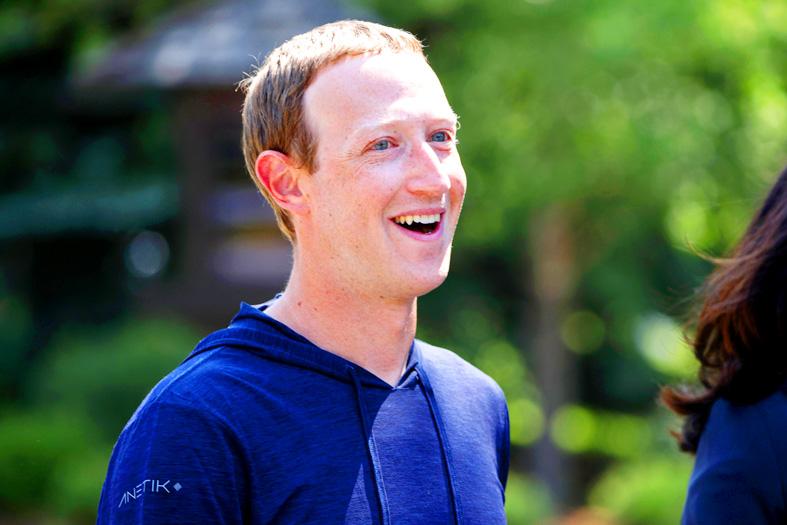Three Australian publishers of lifestyle content say Facebook Inc used their articles on its just-launched news service after refusing to negotiate licensing deals, and that the country’s tough new Internet law has failed to protect them.
Australia this year passed a law that pressured Facebook and Alphabet Inc’s Google to sign deals with some of the country’s biggest news companies by threatening government intervention.
The dispute highlights possible shortcomings in the controversial law. While most of Australia’s main media firms have signed deals, some smaller outlets say the law has not stopped their content generating clicks and advertising revenue for Facebook without compensation.

Photo: AFP
Broadsheet Media, Urban List and Concrete Playground, Web sites which publish entertainment news, reviews and listings, say that after the law was passed in February they approached the social media giant about payment for their content.
Facebook knocked them back, calling their content unsuitable for its Facebook News platform and recommending they apply for grants it was offering from a A$15 million (US$11.04 million) fund for Australian regional and digital newsrooms, the three companies said.
“They told me that: ‘Oh well, you’re not going to be included in News tab and that’s what we’re paying for,’” Broadsheet Media founder Nick Shelton said. “To our surprise, we woke one morning last week and all of our content was there.”
Facebook News went live in Australia on Wednesday last week.
Facebook declined to comment directly on the three companies, but said that it created value for publishers by sending viewers to their sites.
Under the law, Facebook and Google must negotiate payment deals with outlets or a government-appointed arbitrator will do it for them, but a publisher must first prove its primary purpose is producing news and that it has been unfairly disqualified.
The three publishers said they want Facebook to come to the table to talk, but if it declined they might seek government intervention.
“If at the end of the day we don’t get included in a commercial agreement, then absolutely they need a stick,” Shelton said. “We are three prime examples of publishers and media businesses which should be included as part of this framework.”
To be covered by the law, publishers must register as a news provider with the Australian Communications and Media Authority “based on criteria including the levels of ‘core news’ [essentially public interest journalism] that they produce,” the Australian Competition and Consumer Commission, which drafted the law, said in an e-mail.
Urban List has registered on the list. Broadsheet and Concrete Playground have yet to register, saying they want to hold out for a private deal.
Tama Leaver, a professor of Internet studies at Curtin University in Perth, said that while Facebook had not broken the law as the matter was not yet before arbitration, its apparent treatment of the three publishers was “extremely poor practice, disingenuous and further disadvantages the smaller players in the news business arena.”
In a separate dispute, the commission has said it would look into a claim by The Conversation, which publishes current affairs commentary by academics, that Facebook has refused to negotiate a licensing deal. The Conversation has secured a deal with Google.

AI SERVER DEMAND: ‘Overall industry demand continues to outpace supply and we are expanding capacity to meet it,’ the company’s chief executive officer said Hon Hai Precision Industry Co (鴻海精密) yesterday reported that net profit last quarter rose 27 percent from the same quarter last year on the back of demand for cloud services and high-performance computing products. Net profit surged to NT$44.36 billion (US$1.48 billion) from NT$35.04 billion a year earlier. On a quarterly basis, net profit grew 5 percent from NT$42.1 billion. Earnings per share expanded to NT$3.19 from NT$2.53 a year earlier and NT$3.03 in the first quarter. However, a sharp appreciation of the New Taiwan dollar since early May has weighed on the company’s performance, Hon Hai chief financial officer David Huang (黃德才)

The Taiwan Automation Intelligence and Robot Show, which is to be held from Wednesday to Saturday at the Taipei Nangang Exhibition Center, would showcase the latest in artificial intelligence (AI)-driven robotics and automation technologies, the organizer said yesterday. The event would highlight applications in smart manufacturing, as well as information and communications technology, the Taiwan Automation Intelligence and Robotics Association said. More than 1,000 companies are to display innovations in semiconductors, electromechanics, industrial automation and intelligent manufacturing, it said in a news release. Visitors can explore automated guided vehicles, 3D machine vision systems and AI-powered applications at the show, along

FORECAST: The greater computing power needed for emerging AI applications has driven higher demand for advanced semiconductors worldwide, TSMC said The government-supported Industrial Technology Research Institute (ITRI) has raised its forecast for this year’s growth in the output value of Taiwan’s semiconductor industry to above 22 percent on strong global demand for artificial intelligence (AI) applications. In its latest IEK Current Quarterly Model report, the institute said the local semiconductor industry would have output of NT$6.5 trillion (US$216.6 billion) this year, up 22.2 percent from a year earlier, an upward revision from a 19.1 percent increase estimate made in May. The strong showing of the local semiconductor industry largely reflected the stronger-than-expected performance of the integrated circuit (IC) manufacturing segment,

COLLABORATION: Softbank would supply manufacturing gear to the factory, and a joint venture would make AI data center equipment, Young Liu said Hon Hai Precision Industry Co (鴻海精密) would operate a US factory owned by Softbank Group Corp, setting up what is in the running to be the first manufacturing site in the Japanese company’s US$500 billion Stargate venture with OpenAI and Oracle Corp. Softbank is acquiring Hon Hai’s electric-vehicle plant in Ohio, but the Taiwanese company would continue to run the complex after turning it into an artificial intelligence (AI) server production plant, Hon Hai chairman Young Liu (劉揚偉) said yesterday. Softbank would supply manufacturing gear to the factory, and a joint venture between the two companies would make AI data